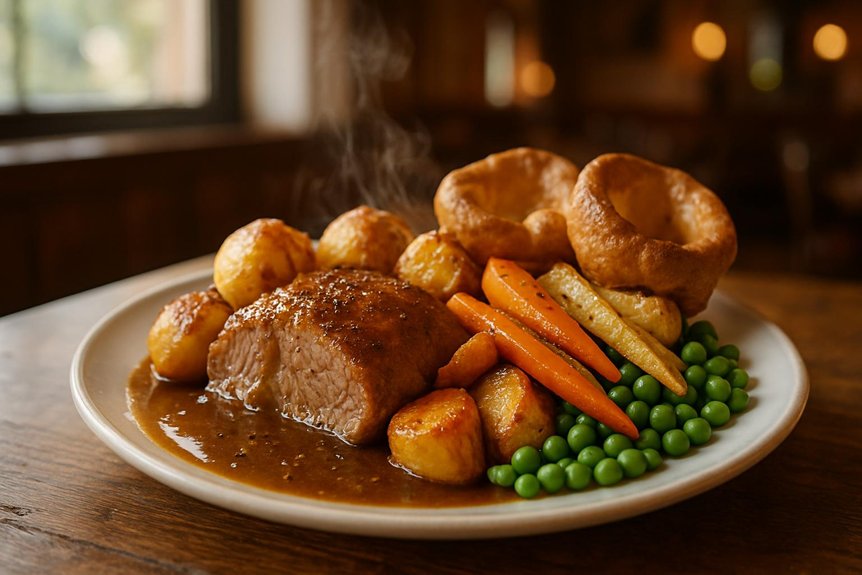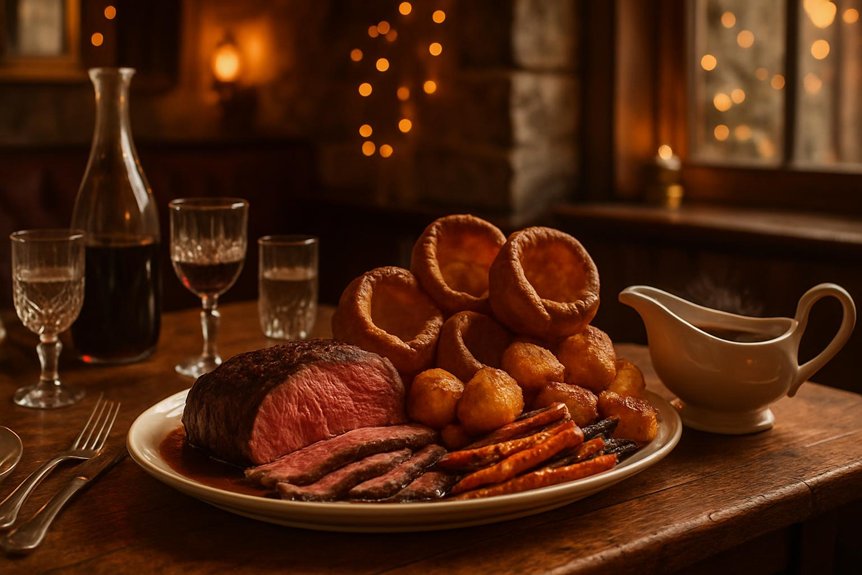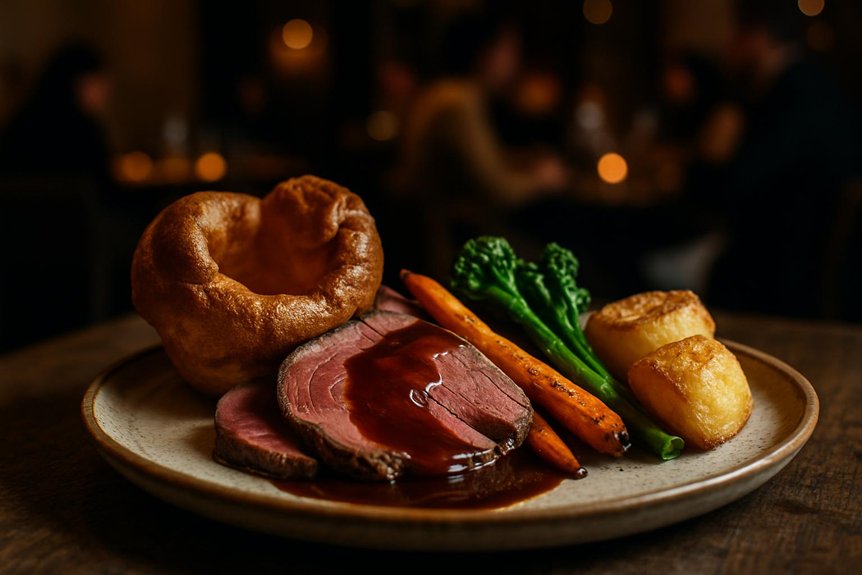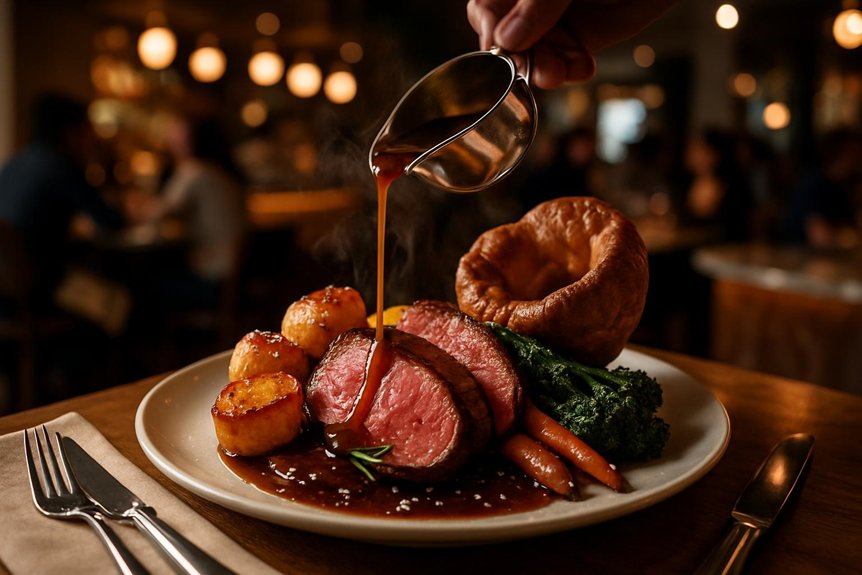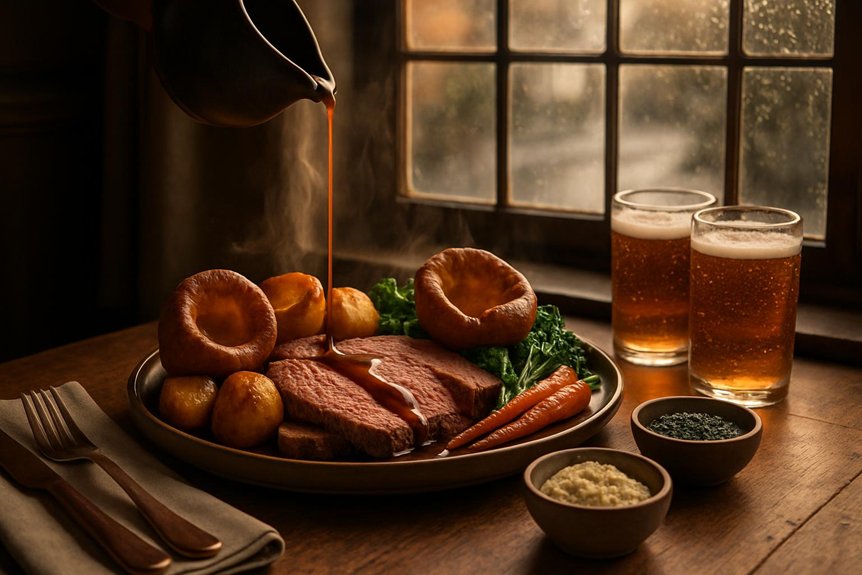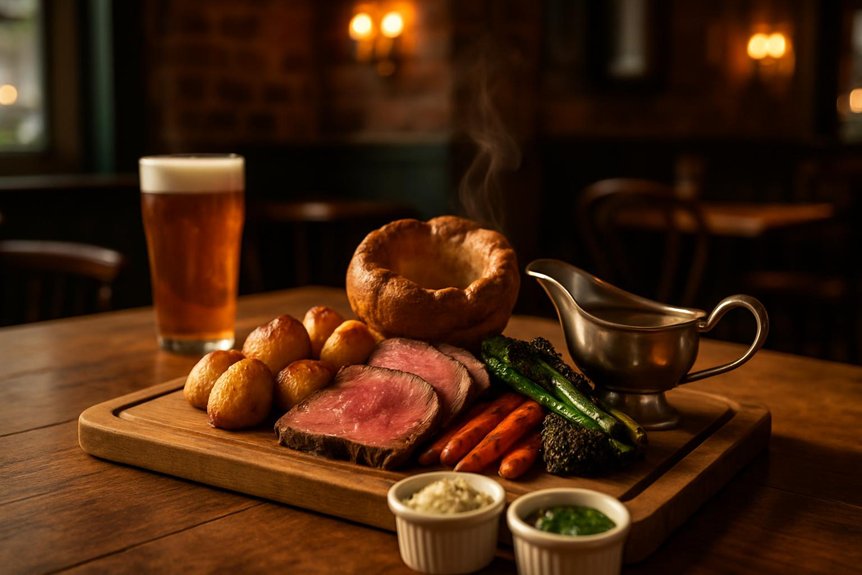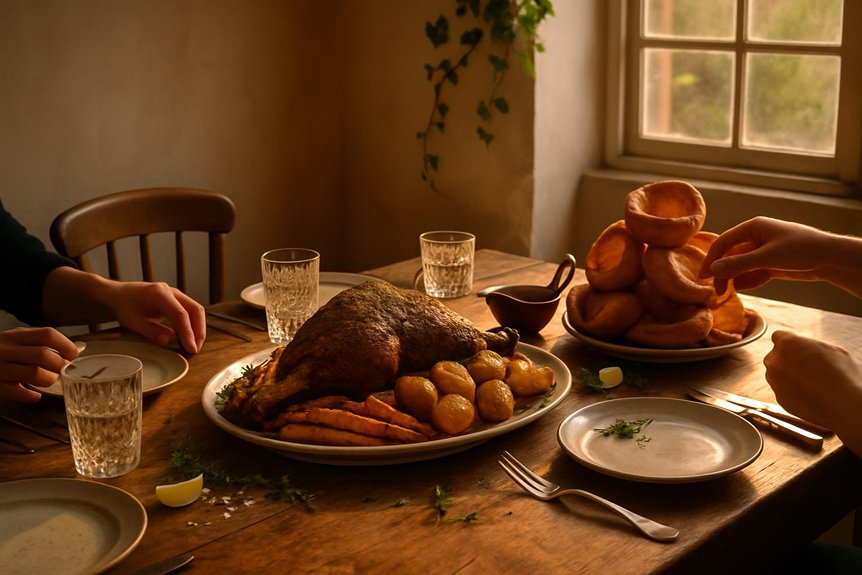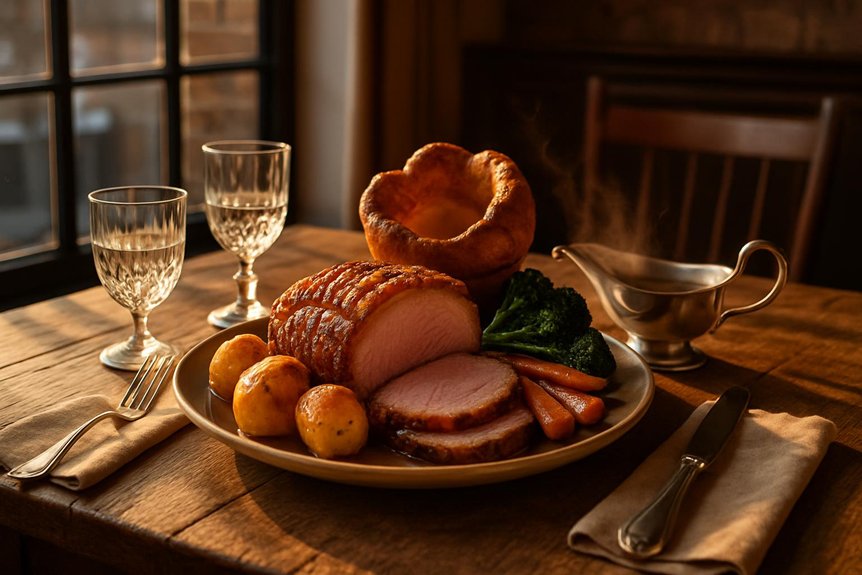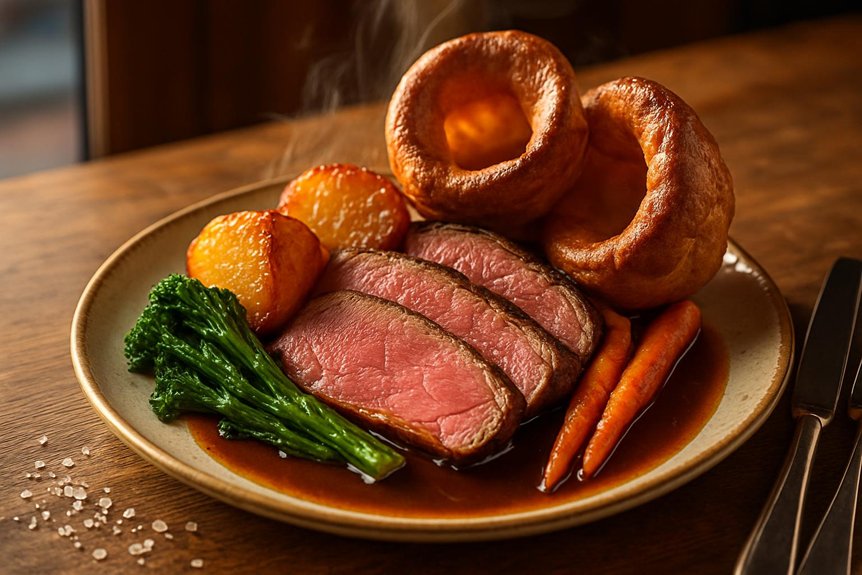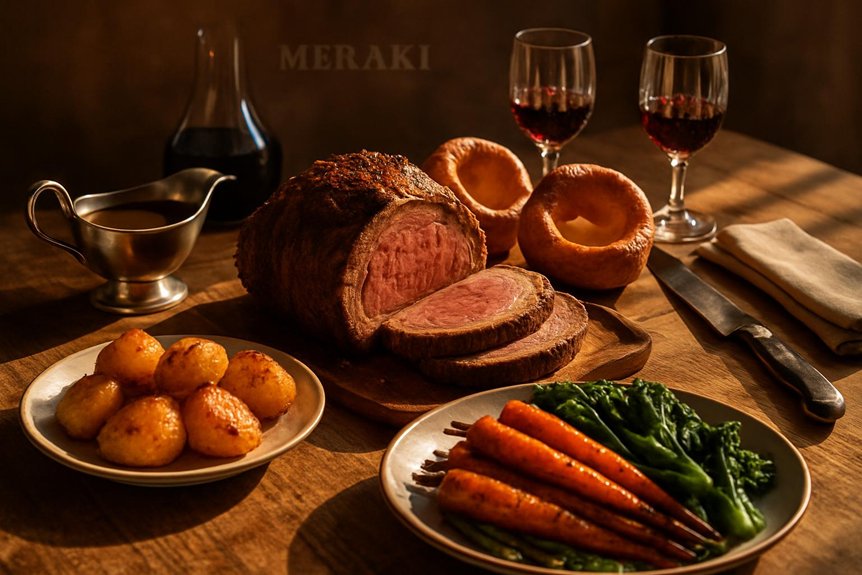Meraki presents a Sunday roast that blends seasonal produce with skilled technique. The kitchen focuses on well-roasted meats, crisp Yorkshire puddings and vibrant sides. Sauces and pairings are considered, service is attentive and the atmosphere comfortably unfussy. There are choices for vegetarians and groups, plus weekend offers worth noting — and a few signature touches that make the meal quietly memorable.
Why Meraki’s Sunday Roast Is a Must-Try
What sets Meraki’s Sunday roast apart is the kitchen’s insistence on seasonality and technique: locally sourced meats are roasted to precise doneness. Vegetables are cooked to retain texture and flavor, and sauces are made from pan jus reduced for depth rather than heavy butter. The service treats each course with restrained confidence, honoring traditional flavors while avoiding excess. Attention to plating presentation elevates familiar components into composed dishes that read cleanly on the plate and invite tasting in balanced bites. Guests note consistent timing and tempering, where crispiness, succulence, and acidity align. This restrained approach positions the roast as both comforting and modern, appealing to diners who seek authenticity executed with culinary discipline rather than theatrical embellishment. In addition to their renowned Sunday roast, Meraki Bar offers a vibrant bar experience with unique cocktails and a bohemian atmosphere reminiscent of Mykonos.
The Roast Menu: Meats, Veggie Options and Seasonal Sides
Building on that restrained philosophy, the roast menu at Meraki centers on a concise selection of expertly cooked meats, a satisfying vegetarian main, and a rotating set of seasonal sides that reflect market availability.
Meats are sourced from trusted suppliers and prepared to showcase natural flavors—roast beef, pork belly and a heritage chicken rotate week to week, presented with precise resting and seasoning.
The vegetarian main often features a nut and mushroom wellington or a glazed root vegetable terrine, designed to stand alongside the meats rather than mimic them.
Vegetable sides change with the season: charred greens, honeyed carrots, buttered new potatoes and braised cabbage appear as appropriate.
The menu concludes with carefully chosen dessert options that complement the roast without excess.
Meraki is celebrated for its exceptional roast beef paired with Yorkshire puddings, which embodies British culinary heritage.
Crown Roast Techniques: How Meraki Perfects the Carve
When carving the crown roast, Meraki treats the joint as both centerpiece and precision cook: the chefs begin by allowing ample rest so juices redistribute. Then use a steady hand and fine-toothed saw to separate individual chops cleanly from the bone. Attention focuses on uniform portioning, trimming excess fat and revealing even medallions that showcase the roast’s crust. Prior to roasting, herb infused marinades subtly penetrate the meat, guiding seasoning rather than masking it; the carving preserves those layered flavors. Each chop is aligned for hand carved presentation, arranged to emphasize symmetry and accessibility for the table. Timing and tool choice minimize juices lost to the plate, producing slices that retain succulence and display consistent doneness across the crown. Meraki’s focus on Mediterranean cuisine ensures that each roast is a harmonious blend of traditional techniques and vibrant flavors, making it a perfect addition to their exquisite menu.
Yorkshire Puddings That Rise to the Occasion
Meraki’s kitchen credits consistently lofty Yorkshire puddings to a precise batter ratio that balances flour, eggs and milk for essential lift.
Equally vital is exact oven temperature timing: preheated fat at high heat followed by strict baking times ensures a crisp exterior and hollow interior.
The combination of careful measurements and punctual oven management is presented as the foundation of their success.
Perfect Batter Ratio
A reliable 1:1:1 ratio of eggs, milk, and flour serves as the foundation for Yorkshire puddings that consistently rise and brown evenly. This balance yields a batter thin enough to steam rapidly in hot fat yet viscous enough to trap air and set into crisp, hollow shells.
Attention to mixing—whisking until smooth but not overworked—prevents gluten toughening and encourages uniform cell structure. Resting the batter briefly allows bubbles to stabilize, improving lift and texture.
Small adjustments, such as a splash more milk for lighter walls or an extra egg for structure, tailor results without abandoning the core ratio.
Finished puddings complement the roast and influence plating presentation; their shape and color also contrast main courses and the dessert selection.
Oven Temperature Timing
Although precise batter composition matters, oven temperature and timing determine whether Yorkshire puddings achieve their signature rise and crispness. Preheating the tray and fat to very high heat (around 230–240°C/450–475°F) creates the sudden steam burst that inflates the batter.
Consistent temperature during the brief baking period (typically 20–25 minutes depending on size) guarantees even browning without collapse. The cook monitors oven stability, avoids opening the door, and times batches to serve puddings at peak height.
Smaller molds reduce the required baking time, while larger ones need careful heat retention. Resting the batter at room temperature supports rapid steam generation.
At Meraki, Yorkshire puddings complement main courses and inform dessert selection planning. They fit the restaurant’s informal yet smart dress code and overall dining rhythm.
Signature Gravies, Jus and Condiments
When diners sink into the warm, wood-paneled dining room, attention quickly shifts to the sauces that define each roast: a glossy beef jus reduced from marrow and roasted bones, a silky chicken gravy brightened with lemon and thyme, and a rosemary-infused lamb jus finished with red wine.
Meraki’s sauce craftsmanship emphasizes balance: concentrated stocks, restrained seasoning, and silk-smooth textures that complement rather than overpower. Condiment variety arrives on small plates—horseradish cream, tangy apple chutney, mustard seed relish and roasted garlic butter—each chosen to lift specific cuts.
Sauces are finished tableside when appropriate, allowing final seasoning and aroma to be adjusted. Presentation is neat, intentional, and informed by technique, ensuring each spoonful enhances the roast’s natural character.
Wine, Beer and Cocktails to Pair With Your Roast
A concise guide outlines which wines best complement each roast, from a bright Pinot for lamb to a structured Cabernet for beef. Complementary beer choices and cocktail pairings are proposed to suit richer gravies and roasted vegetables.
The section frames practical tasting tips and serving temperatures to enhance the Sunday meal.
Wine Pairing Guide
The right drink sharpens the textures and lifts the flavors of a Sunday roast, so Meraki’s pairing guide recommends concise, practical matches—light-bodied reds for roast beef, full-flavored whites for roast chicken and pork, and richer, tannic options for lamb.
Meraki also offers beer and cocktail alternatives for diners who prefer something other than wine. They prioritize sustainable sourcing and highlight classic wine varietals chosen to complement gravies, herb rubs and root vegetables.
Suggested pours include Pinot Noir or Gamay with beef, Chardonnay or Chenin Blanc with chicken, and Syrah or Cabernet blends with lamb. Sparkling wine can cut through fatty cuts; acidic whites refresh the palate.
Staff advise glass-by-glass selection to balance body, acidity and tannin without overpowering the roast.
Beer & Cocktail Matches
Although wine dominates traditional roast pairings, beer and cocktails offer equally effective—and often more casual—matches that highlight different elements of a Sunday roast.
A crisp pilsner or pale ale lifts salt and fat from roast beef, while an amber ale complements caramelized root vegetables. Vegetarian options work well with a saison’s peppery notes or a malty brown ale.
For pork, a citrus-forward gin fizz or a rye-based highball cuts richness. For roast chicken, a classic spritz or light lager enhances herbs.
Dark stouts or porter-based cocktails echo roast gravies and bitters for red meat. Finish considerations include lighter dessert pairing cocktails—fruit-forward spritzes or a tawny port cocktail—to bridge sweet puddings and cheese.
Family-Friendly Vibes and Group Dining Tips
Meraki Restaurant caters to families and larger parties with a relaxed atmosphere, spacious seating, and a menu designed to please varied tastes and ages. Staff accommodate mixed groups efficiently, offering suggestions drawn from both Sunday brunch options and family menus to streamline choices.
Tables suited for children and elders reduce congestion, while high chairs and kid-friendly portions simplify mealtimes. Sharing platters and roast boards encourage communal dining, minimizing ordering friction for groups.
Noise levels remain convivial rather than overpowering, preserving conversation without formal stiffness. Servers time courses to allow socializing between plates, and managers can advise on seating layouts for celebrations.
Practical group tips include preselecting a few set dishes and noting dietary needs ahead to speed service.
Booking, Opening Hours and Special Sunday Offers
Following the practical group tips, guests often want clarity on bookings, hours and Sunday-specific deals before finalizing plans. Reservations via the restaurant website or phone are recommended for peak service; walk-ins are accepted when space allows. Opening hours are consistent to support weekend routines and special menus.
- Booking: online system confirms table size, time, and any requests for dietary accommodations.
- Hours: Sunday service typically begins with a set lunch window and extends into early evening to allow relaxed dining.
- Offers: rotating Sunday promotions may include prix fixe roasts, shared boards, or discounted dessert options for groups.
Policies on cancellations and allergies are stated clearly, ensuring efficient planning and a reliable dining experience.
Local Neighborhood Charm and Getting There
Where is this cosy Sunday roast escape tucked away in the city? Meraki sits on a tree-lined side street near an old market square, its façade blending into local history while offering warm interiors. Visitors approach on foot to appreciate neighborhood scenery: cobbled lanes, period terraces and small artisan shops that frame the route.
Public transport links are convenient — a short walk from the nearest tube and several bus routes pass within minutes — and limited on-street parking requires advance planning for drivers. Cyclists will find secure bike racks around the corner.
Clear signage leads from the main thoroughfare, and staff provide concise directions when booking. The setting enhances the meal, making the journey part of the Sunday ritual.
Conclusion
The theory that a Sunday roast can elevate communal dining finds confirmation at Meraki, where precision cooking and seasonal produce coalesce into a reliably memorable meal. Observing the crown roasts, Yorkshire puddings and nuanced gravies suggests an intentional craft that rewards both regulars and newcomers. Paired wines and convivial service complete the scene, proving that thoughtful technique and warm atmosphere together create an authentic, elevated roast experience worth seeking in London.
